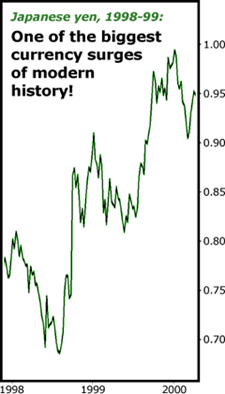US Dollar / Yen - One of the Greatest Market Moves of All Time
Currencies / Japanese Yen Sep 14, 2007 - 08:46 AM GMT Martin here with a change in our line-up that will make a lot of readers very happy: The dollar's decline is now so critical — and surging foreign currencies so potentially profitable — that we have decided to add a tremendous new resource for Money and Markets readers:
Martin here with a change in our line-up that will make a lot of readers very happy: The dollar's decline is now so critical — and surging foreign currencies so potentially profitable — that we have decided to add a tremendous new resource for Money and Markets readers:
Our currency expert, Jack Crooks, will be here for you each Friday morning with his timely insights on the dollar, foreign currencies, international markets, and everything they impact.
Meanwhile, I'm so pleased with Mike Larson's foresight in the real estate and interest rate markets, I have invited him to team up with me in the Money and Markets edition we publish each Monday.
Jack Crooks, who first joined Weiss Research six years ago, is one of America's leading lights on currencies, with more than 20 years of experience in the foreign exchange markets.
Many of the world's most influential investment news outlets rely on him for timely guidance on currencies — including Asian Times , Futures Magazine , Barron's , Reuters, Bloomberg, Dow Jones Newswire, Bloomberg TV and CNBC. And right now, he is working face to face with officials at the Philadelphia Stock Exchange to educate investors about currency trading all over the globe.
I feel Jack's weekly currency reports are not only vital for your protection and profit in the currency market itself, but also essential for every other asset class you own — U.S. stocks and bonds, real estate, international investments, and natural resource stocks.
Just yesterday, for example, the price of oil shattered the $80 barrier. And just in the past three weeks, gold has surged by close to $60 per ounce.
A big, oft-ignored driver of both these markets: The falling dollar.
And in recent decades, some of the most spectacular moves in U.S. stocks and U.S. Treasuries have been precipitated by equally spectacular moves in currencies.
So take currencies seriously and learn everything you can about them, starting with Jack's report today …
One of the Greatest Market Moves of All Timeby Jack Crooks

The Forex market is, without a doubt, the largest market in the world — and the most liquid.
As much as $3 trillion a day trade in the currency market, more than all of the world's stock markets combined.
Moreover, about 80% of all that trading is in seven major currencies, meaning that the volume in each of the majors is massive.
Overall, the currency market is the most critical market to support global trade and international transactions.
But what I like most — and one of the reasons I specialize in this market — is that there's always a bull market in currencies. That gives you the power to make money regardless of what's happening in the world.
Whether the stock market is sinking or soaring, whether real estate is booming or busting, whether interest rates are flying or falling, and regardless of the direction of bonds or commodities.
No matter what's happening, opportunities abound in the currency market.
The reason is simple: Currencies are different from stocks, bonds or commodities in that they let you make money by buying and selling one currency against another.
It's like a see-saw. When one is going down, the other one has to be going up. So there are always currencies going up. There is always a bull market.
Plus, equally important is the fact that currencies move independently from stocks and bonds. They are non-correlated. For the average investor, that means currencies are a great asset class for diversification.
Moreover, unlike the wild days of yesteryear, you no longer have to open big accounts or take huge risks to trade in this market. Two new revolutionary vehicles — currency ETFs and the Philadelphia Exchange's World Currency Options — now make it possible for average investors to trade currencies as easily as any other ETF or option.
The greatest advantage of all? The profit potential thanks to three factors: Big moves, potentially huge leverage, and strictly limited risk.
And right now, that four-letter word RISK is something you want to pay special attention to. Reason:
Global Liquidity Is Deteriorating Badly
Last week, Former Fed Chairman Greenspan declared that the ongoing credit crunch is "identical" to the crisis of 1998 — when Russia defaulted on its debt and the giant hedge fund Long-Term Capital Management came to the brink of collapse.
I disagree. It's actually a lot worse.
The primary source of today's crisis — the mortgage meltdown in the U.S. — is far larger than the source of the crisis in 1998.
The number of hedge funds and other institutions involved is hundreds of times greater.
Most important, in my view, the borrowing of low-interest Japanese yen to buy high-risk investments (the "yen carry trade") is many times larger.
And now, it seems U.S. Treasury Secretary Hank Paulson shares my view. Indeed, this week Paulson warned that:
- We have a severe crisis of confidence in credit markets.
- It is likely to last longer than previous financial shocks of the past two decades.
- It could even last longer than the turmoil that followed the 1998 crisis or Latin American debt crisis of the 1980s!
Good. At least someone besides us realizes this isn't an isolated pain that a couple aspirin can alleviate.
And fortunately, your portfolio doesn't have to just lie there suffering. There are plenty of profits to be made as long as you know where to look.
One of my favorite vehicles: Japan's currency, the yen. Let me explain why …
Dust Off Your "De Lore-Yen," We're Going Back in Time!
Let's step back in time to 1997-1998, focusing on the Asian Financial Crisis.
That's sparked one of the greatest and sharpest rises of any major currency in modern history — the yen was up 20% in just one month, and much more as the year progressed.

I showed you this chart in Money and Markets two weeks ago … and I don't want you to forget it.
Reason: I have a feeling we could see a move of similar (or even greater) proportions very soon.
What was the big force behind the yen's powerful surge back then?
It wasn't economic growth — the Japanese economy was still suffering from an on-again-off-again recession that began earlier in the decade.
And it certainly wasn't the attraction of high interest rates, in as much as the Bank of Japan had been pushing rates sharply lower, maintaining a zero -interest rate policy.
Rather, the yen surged during the Asian Financial Crisis because of a surging worldwide aversion to RISK!
Let me explain.
In the 1990s, Japan slashed its interest rates practically to zero. So investors in the U.S. and elsewhere got the brilliant idea that they could …
- Borrow Japanese yen at lower interest rates …
- Convert them into dollars or other currencies …
- Invest in higher-yielding, higher-risk instruments, and …
- Make a fortune!
That's the "yen carry trade" — using borrowed yen to finance your investments in dollars and other currencies. And back in 1998, close to $140 billion was involved in this transaction.
But as soon as the crisis hit, investors scrambled to reverse the transaction:
- They started losing a fortune on their higher-risk investments in the U.S. and elsewhere.
- They rushed to sell them …
- They bought Japanese yen to pay back the money they had borrowed from Japan, and …
- They drove the value of the Japanese yen through the roof!
That's why the yen surged 20% in just one month. That's the powerful force that created one of the greatest moves in currency of all time.
Back to the Present
Now, I expect the same thing to happen again this time around, and possibly on a much larger scale.
Not only is the credit crunch bigger and longer lasting, as Treasury Secretary Paulson himself said this week. But the amount of money involved in the yen carry trade — estimated at $1 trillion or more — is about seven times greater.
Plus, there's another side of the story no one seems to be telling:
Japanese Investors Themselves Are Getting Scared, So Many Are Repatriating Their Money Invested Overseas
U.S. and other international investors aren't the only ones who have hopped on the carry-trade bandwagon. Domestic investors in Japan are also a big part of this phenomenon: They've been just as quick as anyone else to borrow yen and invest it outside the Japanese archipelago.
Few analysts have paid much attention to this side of the story, perhaps because Japanese investors have typically been slower to run from their overseas investments. But that could be changing very quickly.
A catalyst: Just this week, Japanese Prime Minister Shinzo Abe resigned after his Liberal Democratic party was defeated in elections for the Upper House.
That leaves Japanese investors wondering if their government will now have trouble supporting the economy. Enough of a shock to alter the risk-appetite among investors in Japan? You bet!
In fact, that trend may have already been under way well before Abe's resignation. According to data from Japan's Ministry of Finance, Japanese residents sold more foreign equities than they purchased — to the tune of 273.3 billion yen — this past July. Then, in August, sales of foreign bonds outpaced purchases by more than 690 billion yen.
Year to date, Japanese residents are also net sellers when it comes to transactions in international securities, quite a departure from the prior two years when the Japanese were largely net purchasers.
And remember: When the Japanese (or anyone else) are investing in foreign securities with yen, they have to sell their yen to convert into a foreign currency, driving its price down. So all their overseas investing in recent years contributed to yen weakness .
Conversely, now it's the opposite: When they unload their foreign investments, they have to buy yen to bring their money back home, driving the yen's value up. And all this money repatriation by the Japanese is another big factor that should contribute to yen strength.
There's a pattern emerging: As risk continues to find its way back into global financial markets, we could see the floodgates open and a tidal wave of investors all over the world rush to buy yen.
The net result: Don't be surprised to see a yen surge that rivals — or exceeds — its massive rise of 1998.
Your action: Seriously consider investments that will help you profit from the rise, such as Rydex's Japanese yen ETF.
Want more info and instructions on this hot area?
No problem! Join me and Martin in our free Emergency Video Summit on the Web this coming Wednesday at 12 noon Eastern Time. (To register, visit this web page .)
Best wishes,
By Jack Crooks
This investment news is brought to you by Money and Markets . Money and Markets is a free daily investment newsletter from Martin D. Weiss and Weiss Research analysts offering the latest investing news and financial insights for the stock market, including tips and advice on investing in gold, energy and oil. Dr. Weiss is a leader in the fields of investing, interest rates, financial safety and economic forecasting. To view archives or subscribe, visit http://www.moneyandmarkets.com .
Money and Markets Archive |
© 2005-2022 http://www.MarketOracle.co.uk - The Market Oracle is a FREE Daily Financial Markets Analysis & Forecasting online publication.



